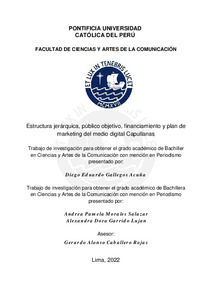| dc.contributor.advisor | Caballero Rojas, Gerardo Alonso | |
| dc.contributor.author | Gallegos Acuña, Diego Eduardo | |
| dc.contributor.author | Morales Salazar, Andrea Pamela | |
| dc.contributor.author | Garrido Lujan, Alexandra Dora | |
| dc.date.accessioned | 2022-08-30T02:20:55Z | |
| dc.date.available | 2022-08-30T02:20:55Z | |
| dc.date.created | 2022 | |
| dc.date.issued | 2022-08-29 | |
| dc.identifier.uri | http://hdl.handle.net/20.500.12404/23197 | |
| dc.description.abstract | Actualmente, los medios tradicionales en el Perú no suelen aplicar el enfoque de género en el
tratamiento y la cobertura periodística, como tampoco suelen informar sobre temas de género.
Sin embargo, cuando lo hacen, se centran en la violencia sexual y feminicidios. Por su parte,
colectivos feministas y medios informativos activistas que sí aplican enfoque de género e
informan sobre sexualidad, reproducción, diversidad y otros, lo suelen hacer de manera
confrontacional, académica y dirigida a un público con conocimientos previos. En ese contexto,
nace el medio periodístico digital Capullanas. Nuestro objetivo es informar sobre temas de
género, enfocándonos en los tres ejes: educación sexual, diversidad y machismo. Nuestra
hipótesis es que, con un lenguaje fresco, sencillo y no confrontacional, nuestra información
llegará a nuestra audiencia, jóvenes entre los 20 y 30 años de edad, que no estén muy
familiarizados con las temáticas, pero que consideren necesario aprender y entender sobre ellas
para construir una sociedad justa e igualitaria. El resultado más importante que obtuvimos fue
que, de todos los formatos explorados en este proyecto, el más exitoso fueron los reels en
TikTok, lo que confirma el crecimiento de esta red social entre jóvenes del Perú y el mundo.
En conclusión, podemos afirmar que mantuvimos nuestra misión y visión periodística al
esforzarnos por ser espacio digital de reflexión al contar historias conmovedoras y difundir
información curiosa, pero es vital publicarla acorde a la coyuntura y en un formato audiovisual
en tendencia como los reels de TikTok. | es_ES |
| dc.description.abstract | Currently, the traditional media in Peru do not usually apply the gender approach in journalistic
treatment and coverage, nor do they report on gender issues. However, when they do, they
focus on sexual violence and femicide. On the other hand, feminist groups and activist media
accounts that apply the gender approach and report on sexuality, reproduction, diversity, and
other topics, usually do so in a confrontational, academic way and directed at a public with
prior knowledge on gender. In this context, the digital journalistic media Capullanas was born.
Our goal is to report on gender issues, focusing on the three axes: sexual education, diversity
and machismo. Our hypothesis is that with a fresh, simple and non-confrontational language,
our information will reach our audience, which is young people between 20 and 30 years old,
who are not very familiar with gender topics, but who consider it necessary to learn and
understand about them in order to build a rightful and egalitarian society. The most important
result we obtained was that, of all the formats explored in this project, the most successful were
the reels on TikTok, which confirms the growth of this social network among young people in
Peru and the world. In conclusion, we can affirm that we maintained our mission and
journalistic vision by striving to be a digital space for reflection by telling stories and giving
curious information, but it is vital to publish it according to the situation and in a trending
audiovisual format such as TikTok reels. | es_ES |
| dc.language.iso | spa | es_ES |
| dc.publisher | Pontificia Universidad Católica del Perú | es_ES |
| dc.rights | info:eu-repo/semantics/openAccess | es_ES |
| dc.rights.uri | http://creativecommons.org/licenses/by/2.5/pe/ | * |
| dc.subject | Género | es_ES |
| dc.subject | Periodismo digital--Perú | es_ES |
| dc.subject | Medios digitales | es_ES |
| dc.subject | Medios sociales | es_ES |
| dc.title | Estructura jerárquica, público objetivo, financiamiento y plan de marketing del medio digital Capullanas | es_ES |
| dc.type | info:eu-repo/semantics/bachelorThesis | es_ES |
| thesis.degree.name | Bachiller en Ciencias y Artes de la Comunicación con mención en Periodismo | es_ES |
| thesis.degree.level | Bachillerato | es_ES |
| thesis.degree.grantor | Pontificia Universidad Católica del Perú. Facultad de Ciencias y Artes de la Comunicación | es_ES |
| thesis.degree.discipline | Ciencias y Artes de la Comunicación con mención en Periodismo | es_ES |
| renati.advisor.dni | 41379178 | |
| renati.advisor.orcid | https://orcid.org/0000-0002-0045-8965 | es_ES |
| renati.author.dni | 73087531 | |
| renati.author.dni | 74705468 | |
| renati.author.dni | 71878365 | |
| renati.discipline | 322126 | es_ES |
| renati.level | https://purl.org/pe-repo/renati/level#bachiller | es_ES |
| renati.type | https://purl.org/pe-repo/renati/type#trabajoDeInvestigacion | es_ES |
| dc.publisher.country | PE | es_ES |
| dc.subject.ocde | https://purl.org/pe-repo/ocde/ford#5.08.00 | es_ES |






